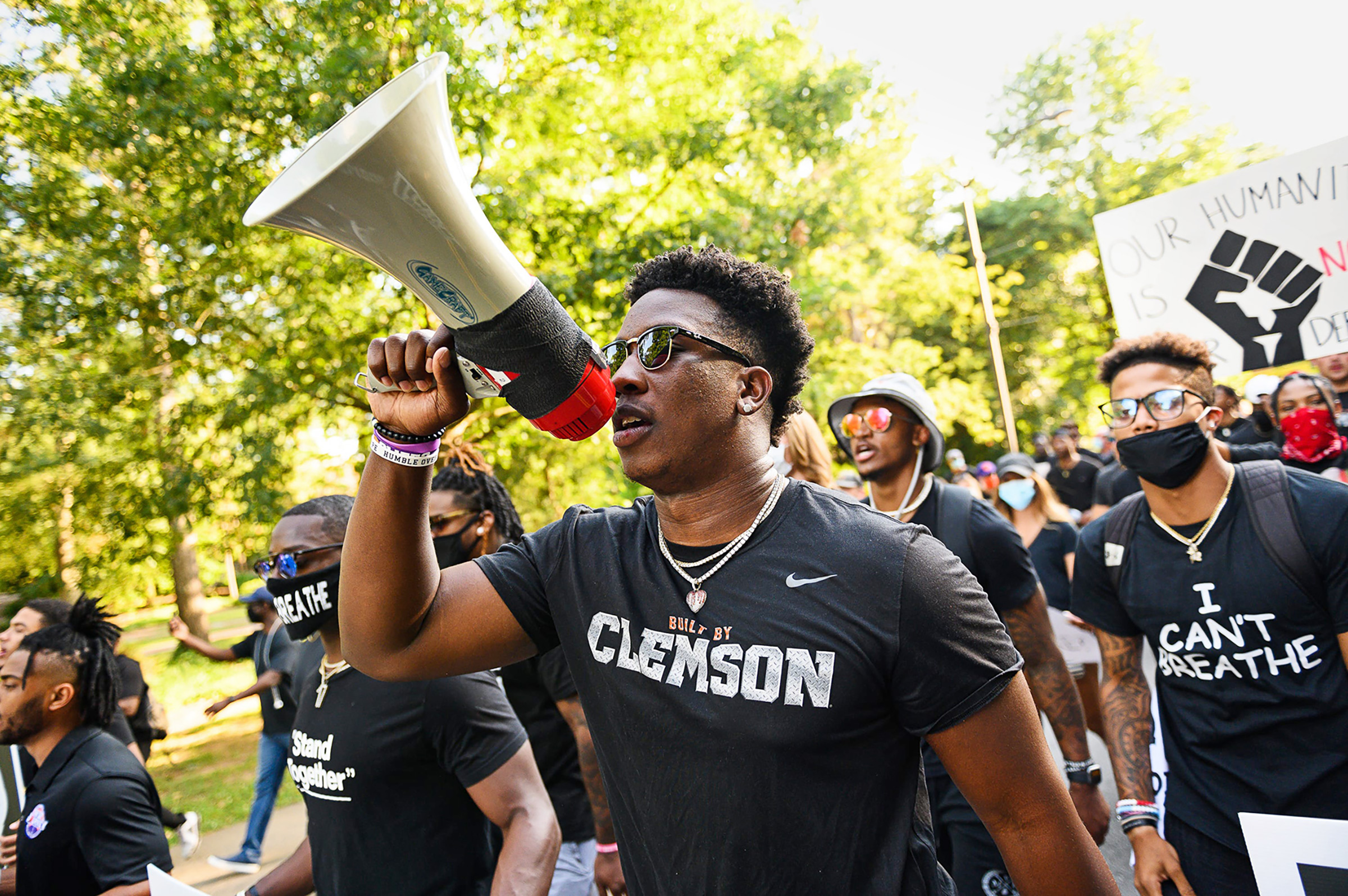
Sports are only just restarting after the COVID-19 shutdown. Yet a swell of athlete activism has already risen worldwide. Soccer stars and jockeys kneel for Black Lives Matter. College athletes fight for justice. A Black NASCAR driver seeks to banish the Confederate flag. The days of keeping a social conscience off the field seem gone forever.
George Floyd’s death has sparked a movement that will only build momentum as more sports leagues–particularly the NBA and NFL, whose players are majority Black and wield immense influence–attempt to come back. And this resurgence of athlete activism, a spiritual descendant of Colin Kaepernick’s peaceful protests during the national anthem in 2016, is destined for more than hashtags and dutiful statements. It’s driven by action.
Take Bubba Wallace, the lone Black driver in NASCAR’s top division. On June 8, he called for an outright ban on the ugly presence of Confederate flags at races. “Get them out of here,” he said. Two days later, NASCAR banned the flag at its events and properties. After a noose was found in Wallace’s garage at the Talladega Superspeedway on June 21, a sea of NASCAR drivers and crew members walked alongside and behind Wallace’s No. 43 car before the next day’s race. Though the FBI later determined no hate crime had been committed–NASCAR said “the garage door pull rope fashioned like a noose had been positioned there since as early as last fall”–the moment will stick with Americans longer than any sprint to the checkered flag.
College athletes, especially football players, are starting to use their considerable leverage. Schools are inviting athletes to return to campuses for workouts before they’re deemed safe for the full student body: football players at Alabama, Kansas State, Clemson, Florida State, Iowa State and other schools have subsequently tested positive for COVID-19. So college athletes, many of whom are Black, are being compelled to risk their health to fuel an endeavor that generates millions of dollars for mostly white coaches and administrators, but restricts their own ability to earn income. This hypocritical system, already reeking of racial injustice and now restarting in a world where Floyd’s death has highlighted the broader systemic racism in the U.S., has proved too much for college athletes to bear.
So at Clemson, football players have led thousands of people protesting racial inequality. At Oklahoma State, star running back Chuba Hubbard called out his coach, Mike Gundy, for wearing a shirt supporting a news outlet that called Black Lives Matter a “farce.” Gundy apologized. Mississippi State running back Kylin Hill tweeted on June 22 that he’d refuse to represent the school if the Confederate stripes aren’t removed from the state flag. “I’m tired,” Hill said. Players at the University of Texas and UCLA have threatened to boycott activities if buildings honoring segregationists aren’t renamed or proper health protocols aren’t in place.
“This is a moment where the outrage of players is stronger than their fear of speaking out,” says Ramogi Huma, executive director of the National College Players Association and a former football player at UCLA. “This has not been the case in modern times.”
Some sports stars are also doing the real work to influence policy. LeBron James is leading the launch of a group to fight voter suppression. Malcolm Jenkins of the New Orleans Saints, co-founder of the Players Coalition, has lobbied legislators for criminal-justice reform. After Floyd’s death, he wrote an op-ed in the Philadelphia Inquirer–Jenkins spent the past six seasons playing for the Eagles–calling for a de-escalation of police violence, and on June 6 he addressed a crowd at the African American Museum in Philadelphia, making the case for a divestment from police and investment in Black business, education, housing and wellness.
“Right now, more than any other time in my lifetime, it feels like we have the ability to literally turn away from the systems that we’ve had for centuries, and actually start over,” Jenkins tells TIME. “Everybody is starting to pay attention. All of our systems were birthed out of white supremacy. Until we turn our backs on those systems and restart America, until we understand the truth of where we are, how we got there and what our roles are, then we can get to that place of reconciliation.”
More Must-Reads from TIME
- Cybersecurity Experts Are Sounding the Alarm on DOGE
- Meet the 2025 Women of the Year
- The Harsh Truth About Disability Inclusion
- Why Do More Young Adults Have Cancer?
- Colman Domingo Leads With Radical Love
- How to Get Better at Doing Things Alone
- Michelle Zauner Stares Down the Darkness
Write to Sean Gregory at sean.gregory@time.com